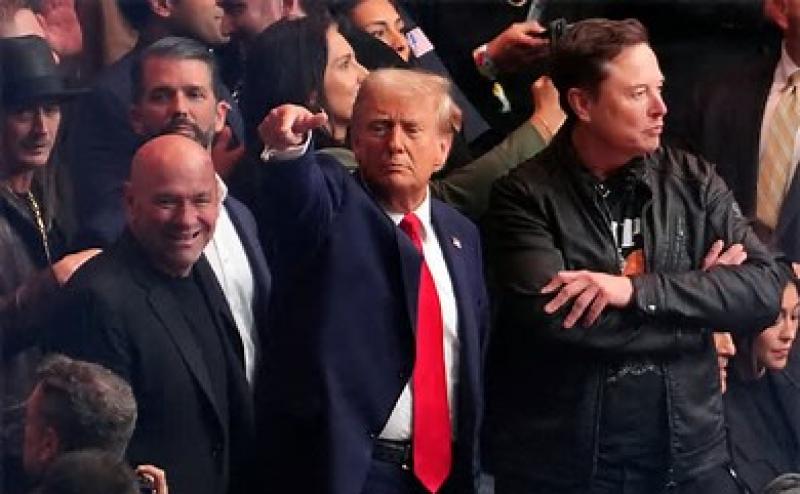It is becoming clear what Trump’s economic policy will look like at the national level.



Instead of trying to expand the economy through investment in infrastructure and manufacturing, Trump’s team has emphasized cutting taxes for the wealthy and corporations and slashing regulations.
The argument behind this approach to the economy is that concentrating wealth in the hands of investors will spur more investment, while creating an environment that’s “friendly” to business will create jobs. Jack Brook of the Associated Press reported that earlier this month, the state of Louisiana illustrated what this policy looks like to ordinary people when it cut income taxes to a flat 3% rate, reducing revenue by about $1.3 billion. They made up that revenue by increasing the sales tax to 5%, thus shifting the burden of taxation to lower- and middle-class families. “Louisiana just became a much more attractive place to do business,” Louisiana economic development secretary Susan Bourgeois told Brook.
It is becoming clear what Trump’s economic policy will look like at the national level. Super wealthy donors funded Trump’s 2024 campaign, and in a departure from every previous incoming president, Trump is refusing to sign the documents required as part of a presidential transition at least in part because those documents mandate that he disclose who is funding his transition and limit those donations to $5,000 per donor. Without that disclosure, it is impossible to see who is funding him. For all we know, that list could include foreign governments.
As activist Melanie D’Arrigo put it on Bluesky: “‘Secret donations’ are bribes. The hundreds of millions he received from Elon Musk and other billionaires are also bribes. There’s a reason Donald Trump isn’t signing ethics pledges.” Indeed, after his first term, the watchdog organization Citizens for Responsibility and Ethics in Washington concluded that “there is absolutely no doubt that Trump tried at every turn to use the presidency to benefit his bottom line,” and noted that those who spent money at Trump’s properties often received favorable policy decisions from the administration.
During the campaign, Trump promised to fight for ordinary Americans, but many of Trump’s picks to fill offices in his administration are notable for their extreme wealth. His pick for treasury secretary is billionaire Scott Bessent, a hedge fund executive who invested money for philanthropist George Soros for more than ten years. To head the Commerce Department, Trump has tapped billionaire Howard Lutnick, the chief executive officer of financial giant Cantor Fitzgerald.
Trump’s choice for education secretary, Linda McMahon, and his choice for Interior Secretary, North Dakota governor Doug Burgum, are both billionaires. And then there are the two men Trump tapped for his Department of Government Efficiency. Former pharmaceutical executive Vivek Ramaswamy is worth around a billion dollars, but Elon Musk is usually at the top of the list of the richest people in the world. He’s worth about $332.6 billion.
Laura Mannweiler of U.S. News and World Report today estimated the worth of Trump’s current roster of appointees to be at least $344.4 billion, more than the gross domestic product of 169 countries. That number does not include Bessent, whose net worth is hard to find. In comparison, Mannweiler notes, the total net worth of the officials in Biden’s Cabinet was about $118 million.
Economist Robert Reich noted yesterday that the wealth of America’s 815 billionaires grew by nearly $280 billion after Trump’s reelection, and the president-elect is promising to extend the 2017 tax cuts that are set to expire in 2025. Now, after all their complaints about the budget deficits under Biden as he invested in the country, Republicans are, according to Andrew Duehren of the New York Times, considering rejiggering the government’s accounting so that extending the tax cuts, which will create about $4 trillion in deficits, shows up as not costing anything.
Deregulation, too, is on the agenda. It’s a cause close to the heart of Elon Musk, who frequently complains that unnecessary regulations are making it impossible for visionary entrepreneurs to develop the technological sector as quickly and efficiently as they could otherwise.
In the Wall Street Journal yesterday, Susan Pulliam, Emily Glazer, and Becky Peterson noted that although Musk says his goal is to “protect life on Earth,” his companies “show a pattern of breaking environmental rules again and again.” The authors report that Tesla’s facility in Fremont, California, has received “more warnings for violations of air pollution rules over the past five years than almost any other company’s plant in California,” 112 of them. Federal regulators recently fined SpaceX for dumping about 262,000 gallons of wastewater into protected wetlands in Texas. Tesla, too, has dumped contaminated water into public sewer systems.
One staffer for environmental compliance told the Environmental Protection Agency that ““Tesla repeatedly asked me to lie to the government so that they could operate without paying for proper environmental controls.”
People who have worked with Musk “for years” told Pulliam, Glazer, and Peterson that they expect Musk will try to cut environmental regulations, especially the ones that affect his companies. After Trump announced that he was creating DOGE and putting Musk in charge of it, Musk posted: “We finally have a mandate to delete the mountain of choking regulations that do not serve the greater good.”
Musk’s companies have brought in at least $15.4 billion in federal contracts over the past decade, and his companies have been targeted in at least 20 government investigations recently. Eric Lipton, David A. Fahrenthold, Aaron Krolik, and Kristen Grind of the New York Times note that Trump’s victory and his appointment of Musk to an oversight role in the government “essentially give[s] the world’s richest man and a major government contractor the power to regulate the regulators who hold sway over his companies, amounting to a potentially enormous conflict of interest.”
Tags
Who is online
50 visitors


But but but Make America Great Again
and the president-elect is promising to extend the 2017 tax cuts that are set to expire in 2025
Repealing them would raise prices on American consumers. I look forward to all the people who need a fainting couch over even the threat of tariffs going ballistic over repealing the Trump tax cuts.
Why is Trump uncomfortable being associated with anyone but billionaires? Billionaires dont give a damn about the working class or middle class except as an abstract.